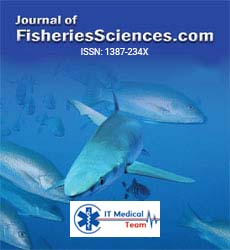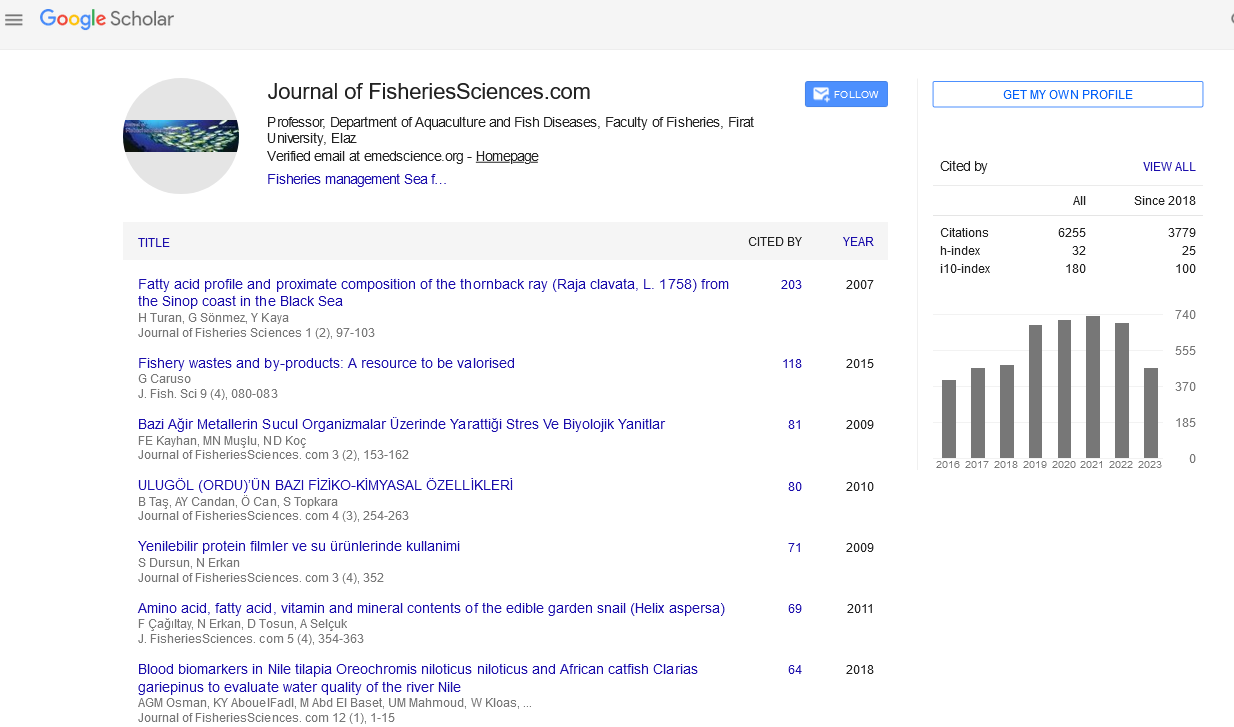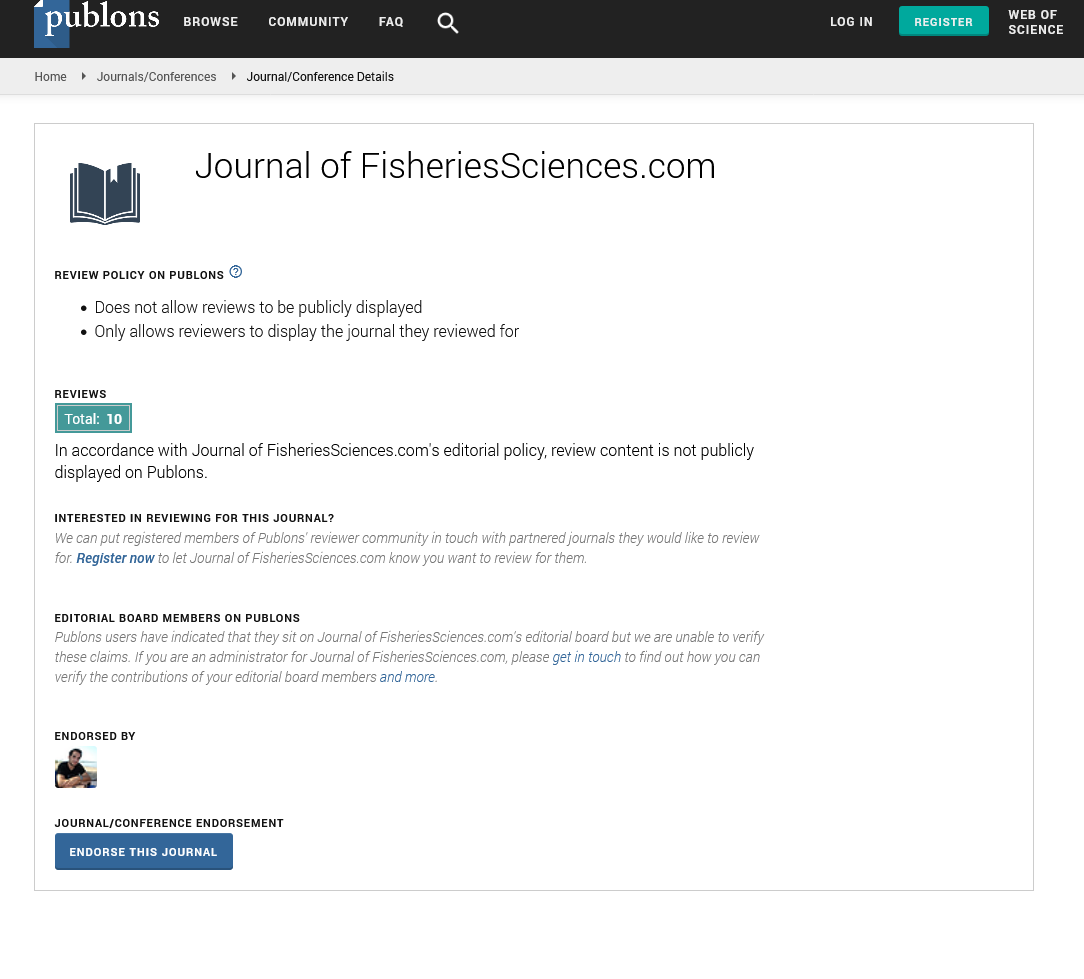Commentary Article - (2022) Volume 16, Issue 6
The Effects of Climate Change on the Fishing Industry and their Mitigation
Majekodunmi Parker*
Department of Biological Science, University of Abuja, Abuja, Nigeria
*Correspondence:
Majekodunmi Parker, Department of Biological Science, University of Abuja, Abuja,
Nigeria,
Email:
Received: 03-Jun-2022, Manuscript No. ipfs-21-9420;
Editor assigned: 06-Jun-2022, Pre QC No. ipfs-21-9420 (PQ);
Reviewed: 20-Jun-2022, QC No. ipfs-21-9420;
Revised: 23-Jun-2022, Manuscript No. ipfs-21-9420 (R);
Published:
30-Jun-2022, DOI: 10.36648/1307-234X.22.16.96
Abstract
The full link between fisheries and climate change is difficult to examine due to the
setting of each fishery and the numerous traces that climate change influences.
However, there is sufficient evidence for these consequences on a worldwide
scale. However, there is sufficient evidence for these consequences on a worldwide
scale. Rising ocean temperatures and acidification are drastically affecting marine
aquatic ecosystems, while changes in water temperature, flow, and fish habitat
loss are wreaking havoc on freshwater ecosystems. Climate change is altering fish
distribution as well as the fertility of marine and freshwater species.
The influence of climate change on ocean systems has an impact on the
sustainability of fisheries and aquaculture, the livelihoods of those who rely on
fisheries, and the oceans' ability to grab and store carbon. Climate change has
a significant influence on coastal fishing populations as a result of sea level rise,
while altering rainfall patterns and water use have an impact on inland freshwater
fisheries and aquaculture.
Introduction
Rising ocean acidity makes it more difficult for marine animals
like shrimp, oysters, and corals to produce their shells, a process
known as calcification [1]. Calcium shells are found in many
essential species, including zooplankton, which provides the base
of the marine food chain. As a result, the entire marine food web
is adapting, and there are ‘cracks in the food chain.' As a result,
the distribution, productivity, and species composition of global
fish production are changing, with complex and interconnected
effects on the oceans, estuaries, coral reefs, mangroves, and sea
grass beds that provide habitat and nursery regions for fish [2].
Changes in rainfall patterns and scarcity of water are having an
influence on river and lake fisheries and aquaculture production.
After the Last Glacial Maximum about 21,000 years ago, the
worldwide average air temperature rose by roughly 3 degrees,
causing sea temperatures to rise [3].
The global ocean's fish catch is expected to fall by 6% by 2100,
and by 11% in tropical zones. Various estimates predict that by
2050, the overall global fish capture potential will change by
less than 10% depending on the trajectory of greenhouse gas
emissions, but with significant local diversity. Reduces in both
marine and terrestrial productivity are expected in nearly 85
percent of coastal countries surveyed, with national capacity to
adapt varied greatly.
Effects of fisher mediation
Mediators can also consider how communities are adapting to
the longer-term effects of climate change [4]. For example, if
a peace agreement establishes a land reform procedure, such
approach may benefit from taking into account the effects of
desertification and land restoration.
Types
Drought, storms, heat waves, rising sea levels, melting ice floes,
and warmer waters can directly injure animals, destroy their
habitats, devastate people's livelihoods and communities[5]. As
climate change intensifies, extreme temperature occurrences
become more common or severe.
Conclusion
Climate change is altering fish distribution and production in
both marine and freshwater ecosystems. This has an impact on
the sustainability of fisheries and aquaculture, the livelihoods of
communities reliant on fisheries, and the ability of the seas to
retain and store carbon.
REFERENCES
- Weatherdon Lauren V, Magnan Alexandre K, Rogers Alex D, Sumaila U Rashid, Cheung William W L, et al. (2016) Observed and Projected Impacts of Climate Change on Marine Fisheries, Aquaculture, Coastal Tourism, and Human Health: An Update. Frontiers in Marine Science 3.
Google Scholar, Crossref, Indexed at
- Doney, S C (March 2006) the Dangers of Ocean Acidification (PDF). Scientific American 294 (3): 58-65. Bibcode: 2006SciAm.294c..58D.
Google Scholar, Cross ref
- Fabry Victoria J, Seibel Brad A, Feely Richard A, Orr James C (2008) Impacts of ocean acidification on marine fauna and ecosystem processes. ICES J Mar Sci 65 (3): 414-432.
Google Scholar, Crossref, Indexed at
- Stenseth Nils (2010) Ecological forecasting under climate change: the case of Baltic cod. Proceedings: Biological Sciences 277 (1691): 2121-2130.
Google Scholar, Crossref, Indexed at
- Chivers William J, Walne Anthony W, Hays Graeme C (2017) Mismatch between marine plankton range movements and the velocity of climate change, Nature Communications. 8 (1): 14434. Bibcode: (2017) NatCo...814434C.
Google Scholar, Crossref, Indexed at
Citation: Parker M (2021) The Effects of
Climate Change on the Fishing Industry and
their Mitigation. J Fish Sci, Vol.16 No. 6: 96.






